We are at the forefront of another “dot-com” boom. The entire cryptocurrency market is breaking all-time highs across the board. Bitcoin is now one of the 30 or so largest currencies in the world, and all across the world, people are looking to invest in bitcoin.
According to the 2017 study done by the Cambridge Centre for Alternative Finance, the Global cryptocurrency benchmark study, the current number of unique active users of cryptocurrency wallets is estimated to be between 2.9 million and 5.8 million and between 5.8 million and 11.5 million wallets are estimated to be currently ‘active’.
Are we in a bubble? Definitely.
But that statement doesn’t say anything, does it? For example, at what stage of the bubble are we at the moment? Well, let’s look at the numbers.
Why invest in Bitcoin?
The current adoption of cryptocurrency is less than 1/2 of 1% of the world population. This places us in the very early days of non-technical adoption. Just look at this year-to-date bitcoin chart, bitcoin went from $750 to almost $12.000.
That. Is. Just. Crazy!
We’re witnessing exponential growth, and it has no signs of stopping. Big money will pour into the market as there are plans to add bitcoin futures by CME and NASDAQ in the coming months.
The total market value of cryptocurrency has increased from $18 billion at the start of the year to over $300 billion today. Just a few years ago cryptocurrencies were portrayed by the media as scams, pyramid schemes, medium for money laundering, terrorist financing and what not.
52% of small exchanges and 35% of large exchanges hold a formal government license. Getting in and out of the market has never been easier and media outlets are changing the rhetoric fast. It seems like everyone is talking about Bitcoin today.
Does Bitcoin have intrinsic value?
Bitcoin is a financial instrument that is based on scientific logic. This logic is derived from the mathematical bases and protocol upon which bitcoin is built. The protocol itself is transparent, and anyone can review the code that’s underlying it. Those who use bitcoin understand the implications.
There are no hidden fees, random fund seizures, blocked accounts, no hassles or declaration forms, or anything like that. The protocol is virtually unhackable and immutable and if appropriately used, entirely private. Bitcoin recognizes no borders, no work hours and no weekend or holidays. Bitcoin put merely is better money than fiat just by the nature of it.
There is a lot of debate in the financial and cryptocurrency world over the real value of Bitcoin so consider everything you read with a grain of salt. An argument can be made that there are several features of bitcoin that give it intrinsic value.
1. Production cost
Like gold, silver or copper, Bitcoin can be considered to be commodity money. The production of Bitcoin comes through a process called mining.
The method of mining, to put it simply requires tremendous processing power and therefore an investment in hardware and electricity. The actual exchange value of Bitcoin between two people may be subjective, but we can reasonably assume that no one would sell their commodities for a lower price than it cost them to “produce” it.
2. Scarcity
The total number of Bitcoins created will never be more than 21 million and the bitcoin creation (mining) will continue till somewhere around the year 2140. This means that Bitcoin is fundamentally scarce.
Also, Bitcoin’s “monetary policy” is deflationary. This means that the number of bitcoins created every 10 minutes follows a decreasing rate. After every 210,000 blocks (approximately four years), the block reward is halved.
For the first four years, starting from Jan 3, 2009 — this was set to 50. So 50 bitcoins were created out of thin air and rewarded to one entity called as a miner (can be an individual or a group of individuals). Then on November 28, 2012, the block reward was halved to 25 and then on 9 July 2016 it was halved to 12.5. The next is scheduled for 2020.
3. Network value
All networks have a hidden utility that translates into direct economic value. Just like Facebook or Instagram have created social value that was converted into real economic value reflected in their stock price, the same applies to the Bitcoin network. Without their userbases, each one of these networks would be worthless.
The price of bitcoin is derived from the total utility of the bitcoin network. In other words, bitcoin’s value is tied explicitly to how many people are in the network, how useful the network is, and what the perceived value of bitcoin is.
4. Medium of exchange / store of value
Our first assumption is that bitcoin will derive its value both from its use as a medium of exchange and as a store of value. As a footnote to this assumption, it should be stated that bitcoin’s utility as a store of value is dependent on its utility as a medium of exchange.
We base this in turn on the assumption that for something to be used as a store of value it needs to have some intrinsic value, and if bitcoin does not achieve success as a medium of exchange, it will have no practical utility and thus no intrinsic value and won’t be appealing to a store of value.
How to invest in Bitcoin?
First things first: Set up a wallet.
There are many different kinds of wallets on the market with many different perks and specs. From hot wallets to cold wallets, hardware wallets, paper wallets, mobile and desktop wallets all of them have various use cases and applications. Choosing a wallet for your personal needs is a research mission on its own. However, since this is a guide on how to invest in Bitcoin, we’ll fix you up.
First, you need to set up a wallet that will allow you to buy the first cryptocurrency. There are several wallets on the market that are suitable hot wallets for doing this such as Coinbase wallet (web wallet hosted by a third party), Blockchain.info, Mycelium (software wallet) and Electrum (mobile wallet). For beginners, most convenient of them all is the Coinbase wallet because it allows for a direct connection with the Coinbase exchange.
Setting up a Coinbase wallet couldn’t be easier.
1. Go to https://www.coinbase.com/ and click on Get Started
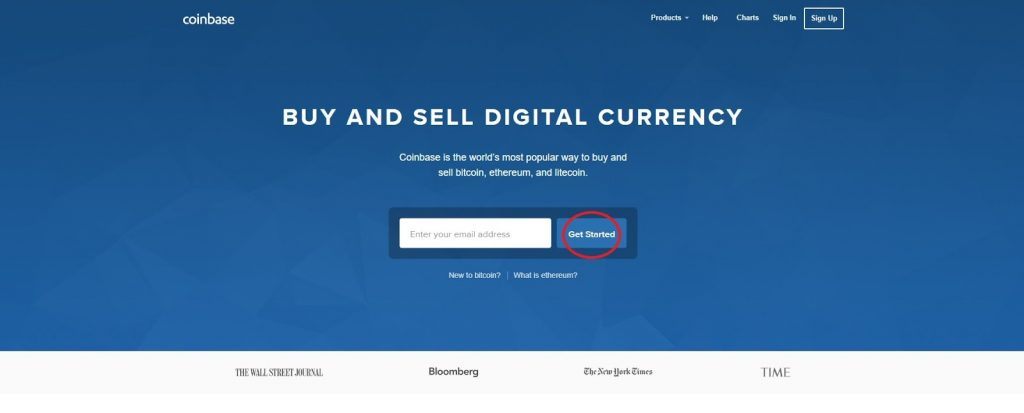
2. Write your first and last name, your email account and make sure to choose a secure and complicated password, then click on create an account.
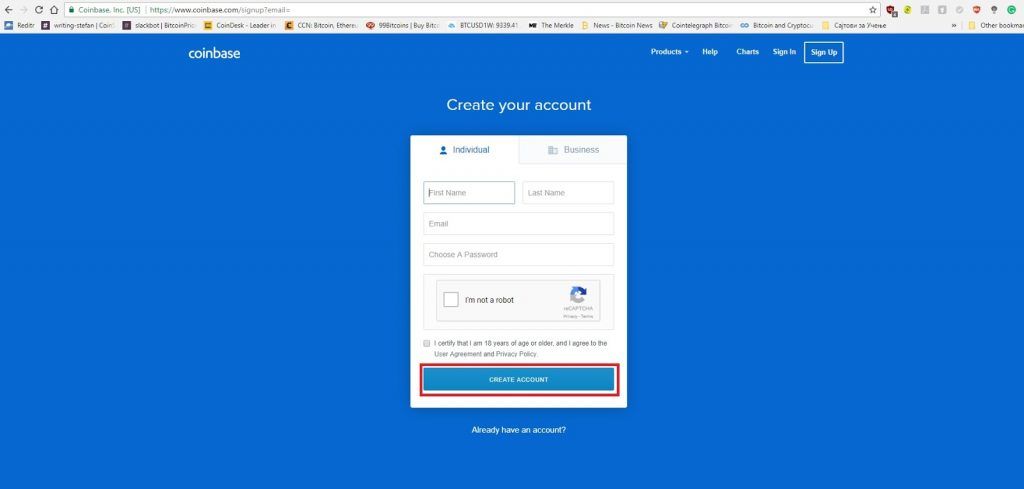
3. You will receive a verification email, and once you verify it, you’ve created a Coinbase bitcoin wallet. But you’re not done here.
Next, you need to link your bank account, PayPal, and credit/debit card so you can start exchanging your currency for Bitcoin or Ethereum. The easiest and fastest method to buy Bitcoin on Coinbase in just 5 minutes is using your credit/debit card.
4. Navigate to Account settings and Click on Payment Methods

5. Click on Credit/Debit Card
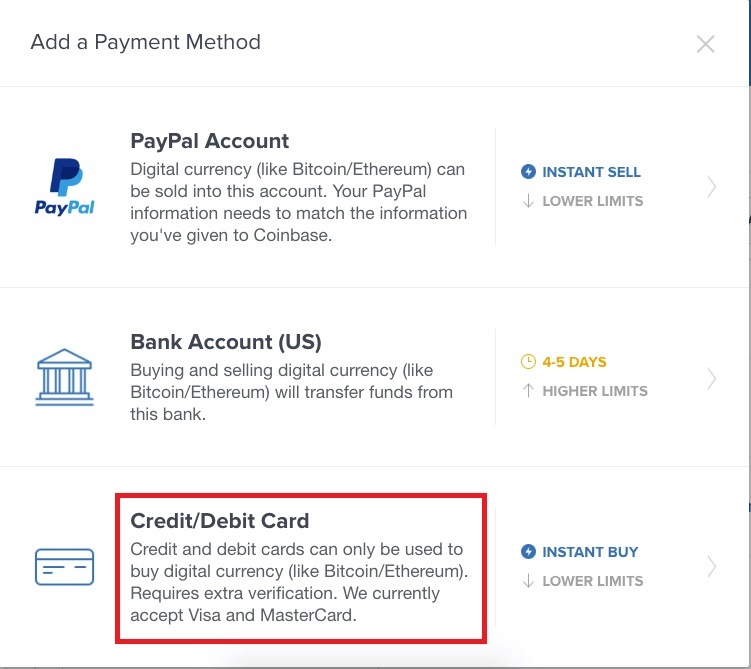
6. Enter your Credit/Debit card information
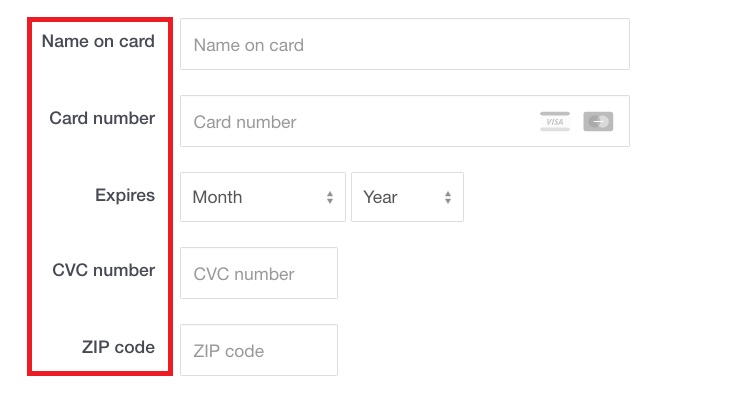
7. You should see a confirmation (If you have provided photo ID verification). Now click on Buy Bitcoin.
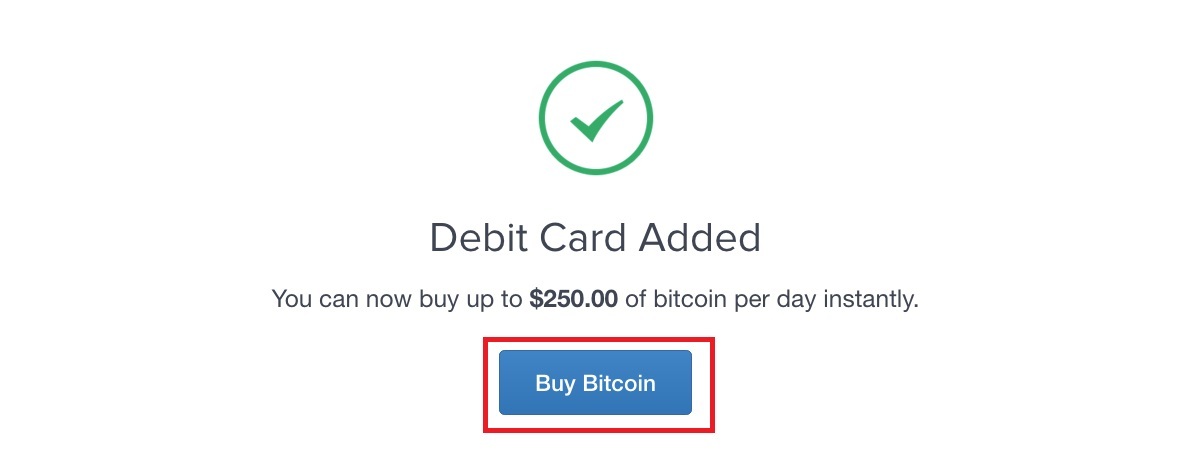
8. Set the number of bitcoins you want to buy with USD, select your Credit/Debit card, use your newly created wallet for the deposit of bitcoins and click “Buy Bitcoin Instantly”
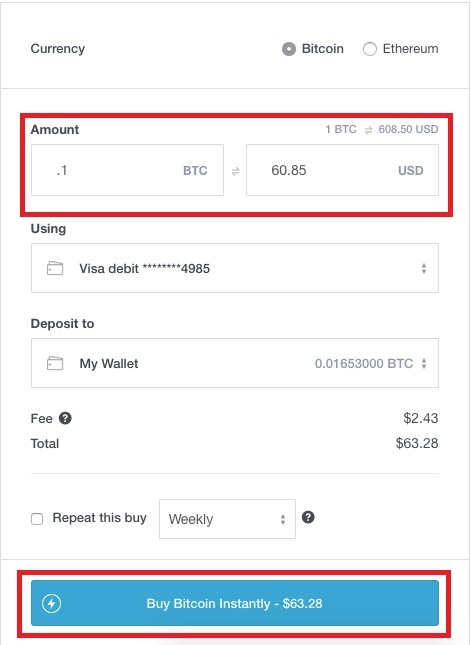
9. HODL HODL HODL
Few friendly tips on the side…
Now that you’ve learned how to invest in bitcoins and you got your first bitcoins you’re probably wondering what to do next?
1. Be real with yourself
First, accept that you’re new (supposedly) to the cryptocurrency investing game. That means you’ll have to do a lot of research in both the cryptocurrency world and learn the basics of investing.
As with anything you invest your money in, you want to know what you’re doing. Consistent updates on the latest cryptocurrency news and trends is a must. The crypto world is novel and unpredictable, technology is moving at lightspeed, and you better keep up with it.
We recommend that you follow few of the top crypto news sites daily (including ours) and keep up with the price changes on coinmarketcap.com.
Educating yourself in the ways of Investing is an investment in itself. You can start by familiarizing yourself with the fundamentals on investopedia.com, and from there you can move to more complicated stuff like reading books on fundamental investing and technical chart analysis.
2. Follow the experts
Let’s get one thing straight:
I’m not a financial advisor nor an expert in investing, so take everything I say with a grain of salt. That being said, take everything you read and see on the Internet with a dose of skepticism and critical thinking.
The Market is a stochastic environment and to believe that anyone in this world can predict market movements with absolute certainty is foolish. But this doesn’t mean that you shouldn’t follow the experts in the industry to keep yourself updated on their reasoning.
Do your research and follow various crypto investors, day traders, software developers, owners of crypto businesses, exchanges and core developers on Twitter/Facebook and other sources. Read what they’re thinking to use your own head. Nobody is right 100% of the time.
3. Take care of the safety of your investment
Hackers are everywhere, and especially in the Wild West that is the crypto world. Every coin has two sides, and cryptocurrencies are no different. Having the freedom to transact with other people and invest without going through a bank means that you’re your own bank.
And banks have vaults and take security very seriously, so to think you shouldn’t do the same is just plain stupid. In the crypto world you’re on your own, and if you get hacked, there’s nobody you can call for help. If you lose your private key or access to your wallet, it’s gone forever, and if you send your bitcoins to a wrong wallet, there’s no getting them back.
So, again, make sure to secure your investment.
First, your password should be incredibly secure, long and complicated, and of course unique. Don’t use the same password you use for your email or your windows login. Don’t give your password or private key to anyone. Second, you should have two-factor authentication on every account that’s important in your life. This means that when you sign in to Coinbase per se, you will receive a second code sent directly to you.
Third, you should consider setting up a hard wallet like Trezor or LedgerNanoS to HODL your Bitcoins. If you want to take extra measures and you have invested serious amounts in Bitcoin, consider using a paper wallet (and make sure you don’t lose it) that didn’t leave any digital fingerprint of its existence. This is the north pole of cold storage.
And finally, a backup plan for your peers and family. If the location of your wallets or your passwords are not known by anyone, and god forbid, anything happens to you, your funds are lost to cyberspace. Take this into serious consideration and make sure you have a bulletproof plan.
4. Beware of scams
This one seems obvious, but it’s really not. The crypto world is still in the legal gray zone, and we are far from having consumer protection laws in the Wild West of investing.
You can be certain that you will be bombarded by snake oil salesmen offering the new “blockchain cure of cancer” and “the ICO that will go through the moon!”.
A 10-year-old kid can make a crypto coin on the Etherium platform and pay someone to advertise it. Are you willing to buy it? If not, then make sure you do a fundamental analysis of every asset you put your money into.
5. Beware of the risks.
Risk management is a science. Investing in financial instruments with high market price volatility, high uncertainty, and confusing regulation is very risky. This is why every financial advisor in the world would advise you never to invest money you cannot afford to lose and make sure to follow this maxim at all times.
Control your greed and have a strategy set in place before you invest your money. Fear of missing out (FOMO) is real in this game and watching the market zig-zag in price, without a set strategy in mind is the worst mistake you can possibly make and you can be sure it will make you a crazy insomniac. Make a decision on the profit margin you’re satisfied with, and loss you can psychologically and financially afford to take and GET OUT when you reach them.
6. Regulations and Taxes in your country
The IRS classifies cryptocurrency as property, so that is how taxes on it are paid. If you cash out your investment less than one year since the initial purchase, you will pay much higher taxes on it.
If you’re not from the USA make sure you’re familiar with the regulations on cryptocurrencies in your country. Don’t try to outsmart the government; it’s never a good idea in the long run. Always keep within the legal boundaries and be a good boy.
How to sell your Bitcoins
Hopefully, you’ve made some profit on your bitcoin investment, and now you want to cash out and convert your bitcoins to fiat. There are two ways you can do this effectively:
1. Sell your bitcoins online
In general, one of the easiest ways to do this is to use an online Bitcoin marketplace like Coinbase that we mentioned earlier.
The process is quite simple:
- Go to the Sells page.
- Enter the amount that you wish to sell.
- Select the wallet you wish to sell from (typically your BTC Wallet).
- Select the account you wish to deposit to (such as your linked Credit/Debit card or Bank account).
- Confirm the order is correct and click Sell Bitcoin.
Alternatively, sell your BTC on an exchange like Circle and Kraken. Primarily they work by pairing sellers with potential buyers and offering themselves as a midpoint escrow service that holds the money until both parties verify the transaction.
2. Selling bitcoin in person
The difficulty of selling bitcoin in person depends on the place you live. It can be easy or a bit of a hassle but ether way tet-a-tet bitcoin transactions have their merits. Privacy or anonymity are the main ones.
Once you connect with a potential buyer, the process is simple and secure. Just scan the QR code on another’s personal phone and take their cash. A piece of cake.
Alternatively, you could advertise yourself as a bitcoin seller on LocalBitcoins.com. This website allows users to search for people willing to buy or sell bitcoins in their vicinity. Once you find someone that’s willing to buy or invest in bitcoins make sure you follow the general safety rules for meeting a stranger from the Internet.
Use crowded places like malls and restaurants, and you shouldn’t have a problem.
Are you just getting started with Bitcoin? How about learning a few things? Also, there’s always Bitcoin Cash as an alternative to Bitcoin – check out our Bitcoin vs Bitcoin Cash guide.
Feature image by MBE